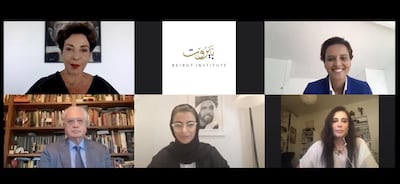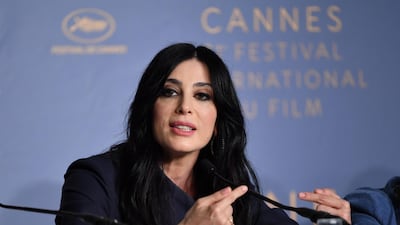Her powerful, award-winning film Capernaum was inspired by child poverty in her native Lebanon.
So, with all that is going on in the world right now, from the ongoing coronavirus pandemic and widespread anti-racism riots to the political and economical instability in Lebanon, one might assume Nadine Labaki is overflowing with cinematic stimulus.
However, that could not be further from the truth.
"Actually, I’m in the most difficult phase of my life where I’m completely uninspired," the filmmaker told a panel of speakers at a Beirut Institute Summit event this week.

"Maybe because I’m trying to observe what’s happening, and let everything sink in. I don’t have enough distance, to tell you you the truth, with what’s happening," Labaki, 46, added.
"We are all trying to do whatever we can, and I am trying to do whatever I can to use my tool, as a filmmaker, to inform some kind of change. I don’t know if we will be ever, in times of such turmoil, able to change the situation, but we are trying to use this tool responsibly."
Labaki was speaking at the sixth e-Policy Circle, a digital conference hosted by the Beirut Institute Summit in Abu Dhabi. The director and actress was joined by Noura Al Kaabi, UAE Minister of Culture and Knowledge Development, French Education Minister Najat Vallaud-Belkacem and Mikhail Piotrovsky, director of the Hermitage Museum in Saint Petersburg, Russia, in the event, held on Wednesday, June 10.
The roundtable, hosted by founder and executive chairman of Beirut Institute Raghida Dergham, may have been held under the theme of Stability Redefined, but the keyword of the night, indisputably, was empathy.
“Stories are a conduit for empathy,” said Al Kaabi in her opening address. “Yet we need it more than ever.”
The minister later described empathy as the "engine of change", adding that it should form the basis of both education and governments. "It is the key for us to understand one another."
Regarding ongoing riots around the globe, sparked by the death of George Floyd while in police custody, Al Kaabi stated that racism is "everywhere", but that the situation had resulted in important stories being told.
"When it comes to equality and education, the pandemic is amplifying how systems work in each country," she said. "When it comes to fixing those problems, we always need to start with ourselves and ask ourselves questions. What are the values that are stemming from the leadership? Any political system needs to have a manifesto that respects those values."
“Education and culture can change the world,” agreed Vallaud-Belkacem. “We need to teach more empathy to our children, more openness to the world, more ability to co-operate.”
Labaki, meanwhile, stressed the importance of ensuring every child has an equal right to education, though highlighted a need to rethink exactly what a modern-day curriculum should offer.
"We have to introduce more art, more music, more theatre, we have to introduce empowerment," the filmmaker, who in 2019 became the first female Arab director to be nominated for an Oscar in the category for Best Foreign Language Film, said.
"Art can ignite empathy. We just have to find ways to develop it and introduce it, to make it more accessible to children, to listen more to our children’s talents.
"We need an education where art is more present, where we give much more importance to building a personality, to building a human being, rather than building an academical level."
How things will change following the pandemic remains to be seen, Al Kaabi mused, but shared a belief that if the world returns to its previous understanding of education or "excessive spending", then "I don’t think we learnt anything".
"We need to go back to environmental values, values of coexistence, respect, in terms of not judging on background or faith or race and … it’s importance to educate our kids on values before religion, if religion is an important subject in school."
Reflecting on how education and cultural institutions have adapted to the pandemic, the Minister of Culture and Knowledge Development highlighted the embrace of technology.
“When it comes to culture, we’re all the same, we’re utilising those digital platforms to communicate and to connect. Although … at the end of the day, we need to see one other, we need to feel the art, smell and touch it, so our senses are deprived now," she acknowledged.
Touching on the closure of museums and cultural institutions in the UAE, Al Kaabi said the current climate had presenting an opportunity for change.
"We’re all struggling here with the closures and limitations of museums, yet now it’s about looking at what are we going to do if we want to capitalise on the content we have, and encourage or enrich the digital content," she said. "Education may now be online but is all of our literature online? I don’t think so. Are all our art pieces with all their research online? This is the kind of opportunity that Louvre Abu Dhabi is working on right now."
Piotrovsky revealed that the Hermitage Museum, which usually receives around five million visitors a year, had welcomed 34 million visitors online in the space of two months.
“Now is the right time for culture," he said. "Culture is a medicine which can cure some of our problems."
As Labaki succinctly noted, the current situation may have left many with more questions than answers.
"Have we learnt anything and are we in such a hurry to go back to our old lives, ignoring what we have become? Are our systems exploring alternatives, are we starting to think differently, are we trying to build a new world?"
But, above all, the director urged people to have hope, even in these testing times, courtesy of the opportunities they may present.
"Frankly, for me this is the death of a certain kind of world," said the director, "and the birth of a new world, a new world where there’s equal chances for people in life."


